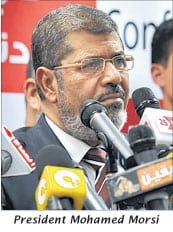Arab World Ministries Media celebrates 50 years
Where were you in 1959? In that year, the first section of the M1 motorway opened, the UK began to use postal codes and Barbie dolls first went on sale.
In the backstreets of Marrakech in 1959, Moroccan cooks were bashing spices in their mortars. Cars, donkeys and pedlars wound their way through the narrow streets. When the electricity faltered, a few rays of the sun filtered through the shutters to light up dim kitchens.
In one of those houses in Marrakech’s old city, a group of missionaries and a Moroccan man were recording a radio programme in their living room. This small beginning was the birth of Arab World Ministries (AWM) Media.
Well prepared
Don Harris had always been keen on electronics. While in the British army, he was drafted to a radio squadron, which helped prepare him for his future radio ministry. When Don and his wife Mary first arrived in Morocco as missionaries in the 1950s, this type of work seemed impossible. But, when Don was asked to begin a radio work in North Africa, he was thrilled and jumped to the task.
As the Harrises set up a simple recording studio in their home in Marrakech, Farid (not his real name), a Moroccan believer, came to visit for a few days. Perhaps this was ‘the voice’ of the burgeoning radio work? Don asked Farid if he would help prepare materials for broadcast and he agreed.
Part way through Farid’s first test reading, there was a knock on the door. The postman was there with a letter which contained £75 for ‘the beginning of radio work’. The small team was filled with worship and wonder.
Elsewhere in North Africa
During pre-independence years in North Africa, in the late 1950s, traditional missionary activity such as Bible correspondence course work was permitted among the national Arabs and Berbers. While the strong Muslim character of these French colonies imposed some restrictions, resident missionaries freely pursued personal witness and literature distribution.
The correspondence course ministry grew by exposure at national book fairs and rallies and by word of mouth. By the early 1960s hundreds were studying the Bible. In January 1963, 2000 courses were sent out in Tunisia alone.
At one agricultural college, fifteen students were studying Bible courses. One said he was a Christian, causing an uproar. The supervisor told him to stop his studies, to which the student replied, ‘I am a Christian and therefore have the right to study the Bible’. The supervisor threw up his hands and told them to study if they liked.
But the wind was about to change. In March 1963, the Tunisian government issued a verbal warning saying that all activities connected with the Christian centre must cease. The missionaries were told that they were ‘in danger of creating a Christian minority’.
Within days the police closed the centre and padlocked the doors. The missionaries were able to retrieve equipment and materials, but they had to make other plans for their ministries.
Radio work became plagued with problems. So, by the end of 1963, mission leaders decided to consolidate the correspondence course and radio work in one centre outside North Africa. As some of the correspondence workers were in Marseille, they chose to locate the work in that city. This was in 1964.
Church partnership
While churches in the Middle East have existed since the time of Christ, the church in North Africa has been re-born in the last few decades. Christian radio has played an important role in the establishment of this emerging church.
National Arab leaders speak of the evangelistic and discipleship role that the radio played in their lives. While media pioneers have focused on evangelism, today AWM Media is increasingly involved in discipleship and leadership training of national believers across the Arab world.
The involvement of Arab believers in media ministry has been happening for some time now. Much of the correspondence ministry, reaching people by radio, television, video or the Internet, has been handled inside the Arab world. In future we expect to transfer more and more of our other media ministry activity to the Arab world, as we equip the national church to carry out the work.
The use of the Internet has exploded in the last decade and AWM Media has been making use of this new technology. The main emphasis today is on the Arabic evangelistic website Maarifa, which means ‘knowledge’. It contains a youth section, video, FAQs and regular devotions.
AWM Media began as a home-grown radio programme and is now is touching the entire Arab world. This expansion has used the changing technology and there have been changes in the audience reached.
Pray for the ongoing of this strategic work, as it seeks to engage, equip, evangelise and establish believers and seekers from the Arab Muslim world.
Christine McLaren












